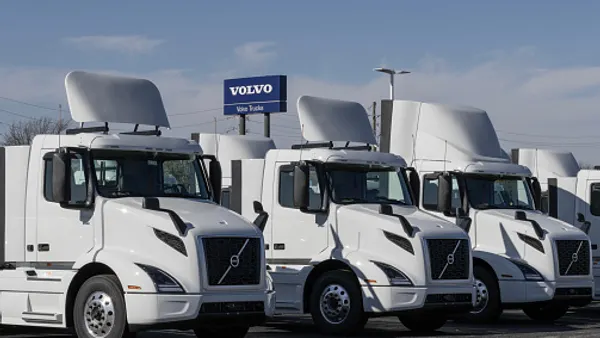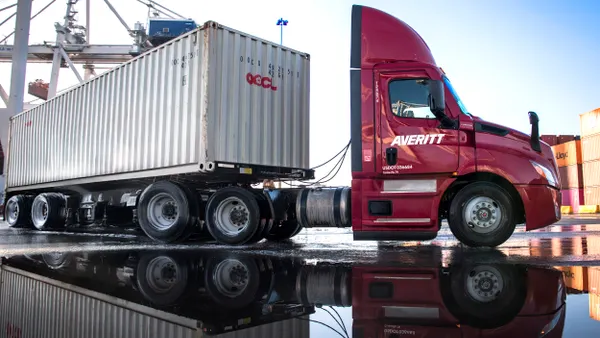Dive Brief:
- Knight-Swift Transportation lowered its fourth-quarter earnings guidance last week on the back of continued overcapacity in the trucking market. This is the second time the company has lowered guidance this year.
- "The industry continues to be oversupplied with truckload capacity, which led to more muted seasonal improvement in the freight market from third to fourth quarter," the company said in a press release. "This resulted in fewer than expected seasonal high-yield freight opportunities."
- The company said recent bankruptcies in the trucking industry and the recent decrease in Class 8 truck orders will result in truck capacity falling more in line with current demand.
Dive Insight:
The trucking market in 2019 was characterized by overcapacity, which resulted in good prices and options for shippers, but left the industry flailing.
Volatile conditions reached a crescendo this month when Celadon Group filed for Chapter 11 bankruptcy — though this can't be fully blamed on the market. The company was also dealing with the fallout of a securities and accounting fraud scheme involving former executives.
Knight-Swift noted in its release it expects truck capacity to fall more in line with demand in 2020. Recent order data from Act Research supports this premise.
"After peak build and sales in 2019, significant declines are ahead in 2020, as sales and build will follow trends in net orders and backlog volumes lower in their respective markets," Kenny Vieth, ACT Research's President and Senior Analyst, said in a statement.
"That weakness in turn is driven by the above-trend buying of the past 18 months," Vieth said.
Trucking companies are investing in fewer trucks and trailers. Trailer orders were down 38% month-over-month (MoM) and 56% yea-over-year (YoY) in November. Meanwhile, the combined net orders of trucks, Classes 5 through 8, fell 15% MoM and 38% YoY, according to ACT.
Tim Denoyer, ACT's Vice President and Senior Analyst, said the market is trying to right-size as capacity has increased partially as a result of private fleets in retail.
“The freight market downturn worsened in the past month and uncertainty surrounding trade and tariffs continue to weigh on truck buyers' psyches," Denoyer said in a statement. "With rising pressure on carrier profits from the combined impact of lower rates and the recent, rather sudden jump in insurance premia, recent events have not developed in the industry's favor."













